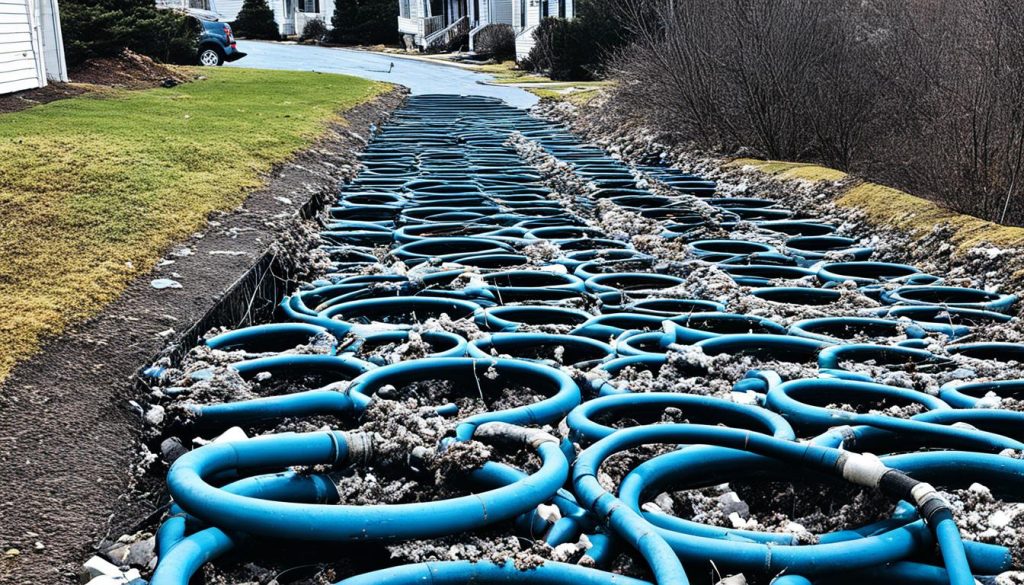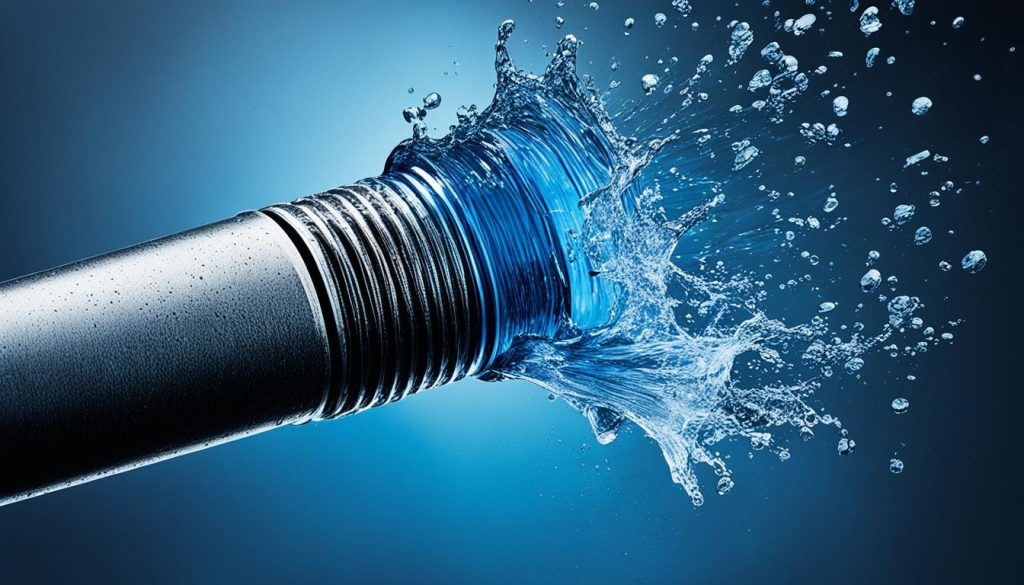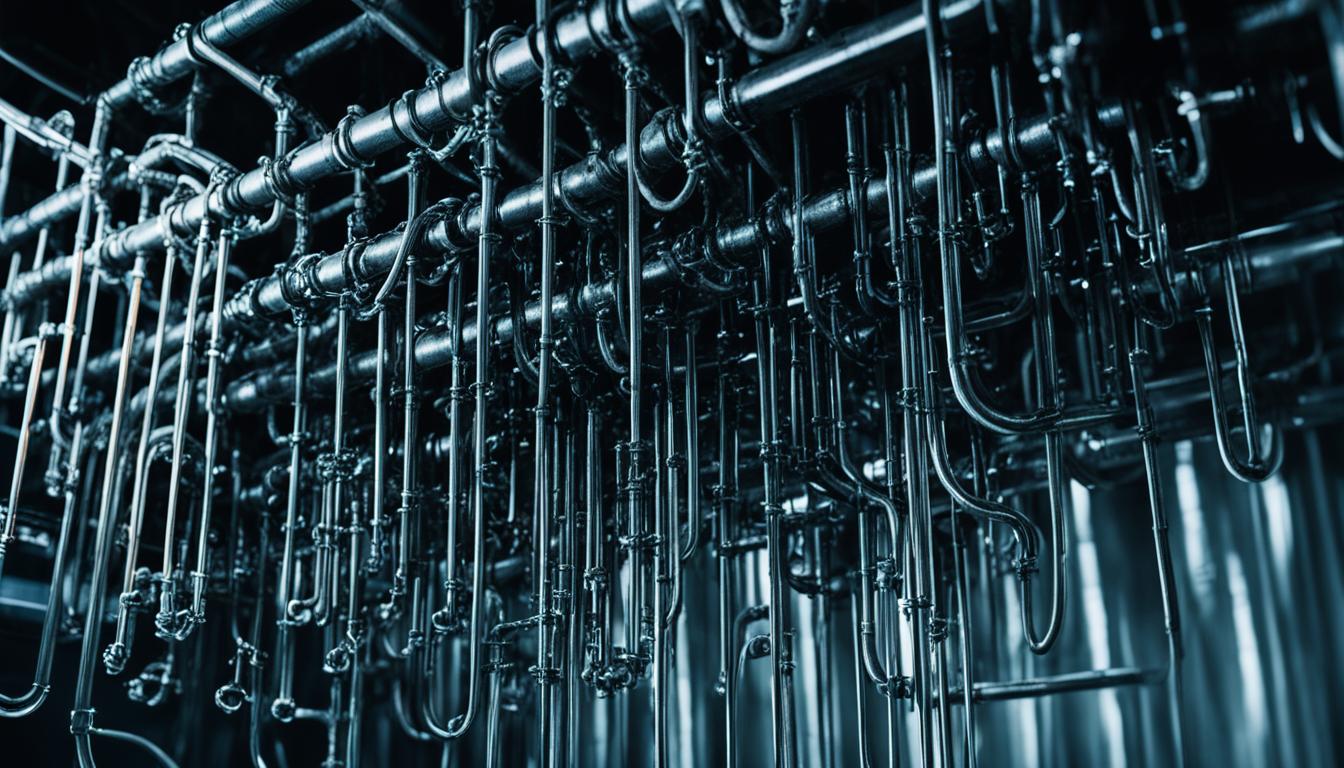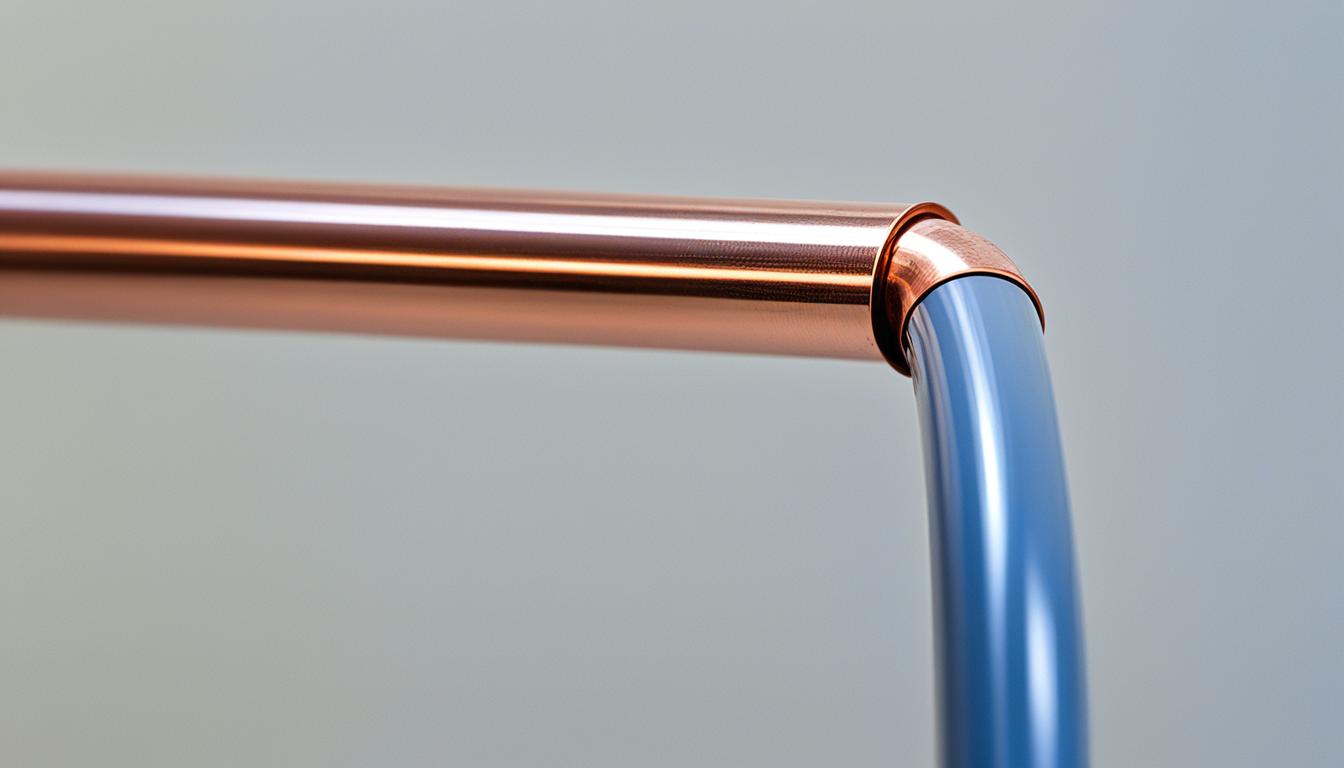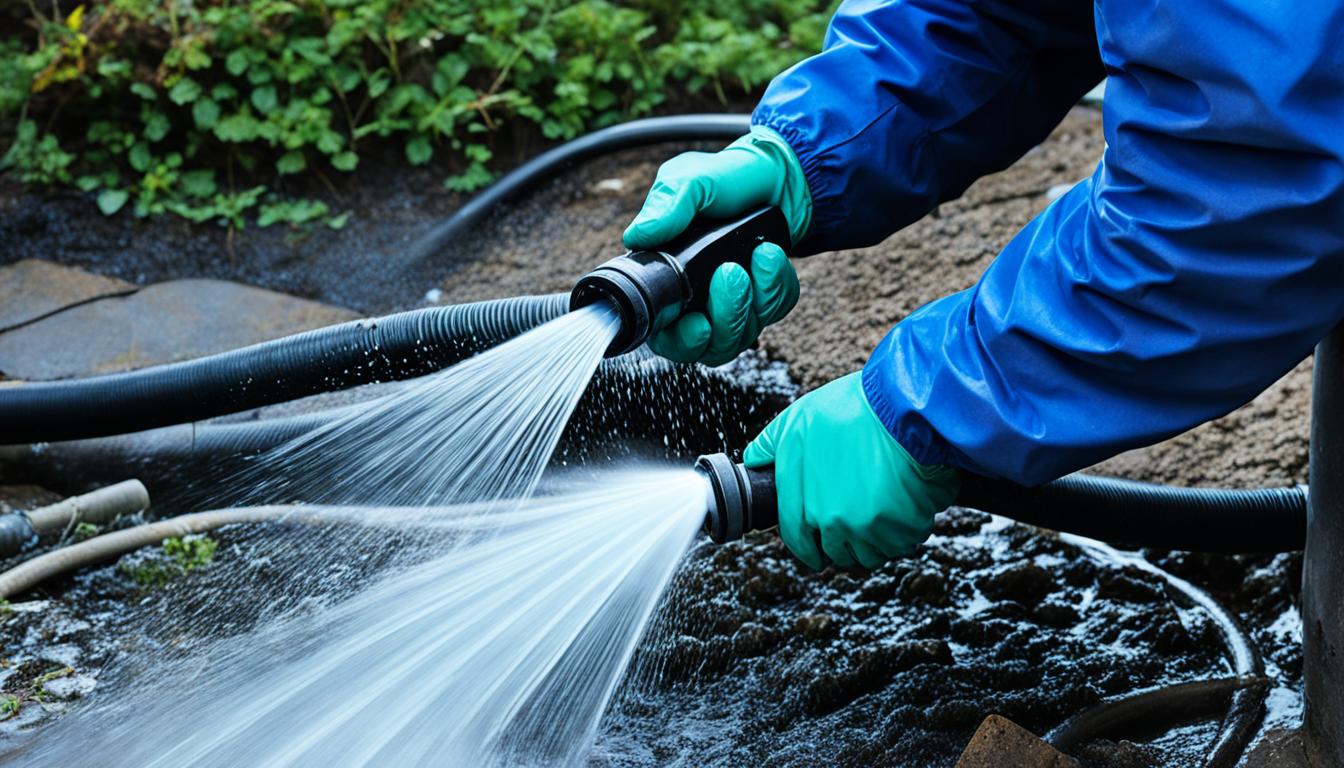Solving Noise in Water Pipes at Night Tips
Did you know that 87% of homeowners in Canada experience noise in their water pipes at night?
Waking up to mysterious sounds coming from your plumbing can be both frustrating and unsettling. The constant rattling, banging, or humming can disrupt your sleep and leave you wondering what’s causing the noise. But fear not, because in this article, I will share some valuable tips to help you solve the problem of noisy water pipes at night.
Key Takeaways:
- Understanding your residential plumbing system is crucial for tackling pipe noise issues.
- Common causes of noise include high water pressure, water hammer, air bubbles, clogged pipes, and loose components.
- Solutions for noisy water pipes include checking water pressure, installing a pressure-reducing valve, using water hammer arrestors, flushing pipes to remove air bubbles, clearing clogs, and tightening loose components.
- If DIY solutions don’t work, it’s advisable to seek professional help for plumbing repairs.
- Remember, a peaceful and quiet home environment is just a few steps away!
Understanding Your Residential Plumbing System
To tackle the issue of noise in water pipes, it’s important to have a basic understanding of your residential plumbing system. This system includes various components that work together to ensure the proper functioning of your plumbing system and the efficient flow of water throughout your home.
One essential component of the residential plumbing system is the service line. This line connects your home to the main sewer line, allowing wastewater to flow out of your home and into the municipal sewer system.
Another crucial part of the plumbing system is the sanitary sewer line. This line connects all the drains in your home, including the ones in your kitchen, bathroom, and laundry room, to the main city sewer line. It plays a vital role in the proper disposal of wastewater.
Your residential plumbing system also includes a hot water heater. This appliance is responsible for heating water for use in your home, whether it’s for showering, washing dishes, or doing laundry.
P-Traps are another important component of your plumbing system. These curved pipes are located beneath sinks, showers, and toilets. They prevent wastewater odors from entering your home by creating a water seal, and they also provide a convenient access point for retrieving dropped objects.
Additionally, your plumbing system consists of various appliances and fixtures throughout your home. These include sinks, toilets, showers, bathtubs, washing machines, and dishwashers. Each of these appliances and fixtures is equipped with inlet and outlet pipes that allow water to enter and exit.
By having knowledge of these components within your residential plumbing system, you can better identify the source of the noise in your water pipes and find appropriate solutions to resolve the issue.
Common Causes of Noise in Water Pipes
Noisy water pipes can be a nuisance, disrupting your peace and tranquility at home. Understanding the common causes of these noises is crucial in finding the right solution to quiet down your plumbing system. Here are some of the main culprits:
High Water Pressure
High water pressure can lead to humming or vibrating sounds in your pipes. This excessive force can put strain on the plumbing system, causing the noise. It’s important to address high water pressure to prevent any long-term damage to your pipes.
Water Hammer
Water hammer occurs when the flow of water is abruptly stopped, such as when a faucet or valve is turned off. The sudden stop can create a loud banging noise, resembling a hammer hitting the pipes. Water hammer can be disruptive and may lead to pipe damage if left unaddressed.
Air Bubbles
When air gets trapped in your plumbing system, it can cause bubbling or humming sounds in the pipes. These air bubbles often occur when the water supply is turned on or off, creating noise as they travel through the pipes. Removing air bubbles can help restore quietness to your plumbing system.
Clogged Pipes
Clogs can cause gurgling or sucking noises in your water pipes. When pipes become obstructed by debris or buildup, it disrupts the normal flow of water, resulting in unusual sounds. Clearing clogs is essential not only for noise reduction but also for the proper functioning of your plumbing system.
Loose Components
Loose components, such as washers and pipes, can produce rattling, whistling, or squealing noises. As water passes through the loose parts, they vibrate and create these unpleasant sounds. Tightening or securing these loose components can eliminate the noise and restore peace to your home.
By identifying these common causes of noise in water pipes, you can take the necessary steps to address them. In the next section, we will explore possible solutions to eliminate or reduce the noise in your plumbing system.
Solutions for Noisy Water Pipes
If you’re dealing with noisy water pipes, there are several solutions you can try to reduce or eliminate the noise. Here are some effective methods:
1. Check Water Pressure
High water pressure can contribute to noisy pipes. To address this issue, check the water pressure in your home using a pressure gauge. If the pressure is above the recommended range (typically 40-80 psi), consider installing a pressure-reducing valve. This valve will regulate the water pressure and prevent excessive noise.
2. Install a Pressure-Reducing Valve
A pressure-reducing valve is a device that can be installed on the main water supply line to reduce the water pressure entering your home. This valve helps prevent the pipes from vibrating and making noise. It’s a simple and effective solution for noise reduction.
3. Use Water Hammer Arrestors
Water hammer is a common cause of noisy pipes. It occurs when water flow is abruptly stopped, causing a loud banging noise. Installing water hammer arrestors can help absorb the force of the water flow and prevent the pipes from rattling. These devices act as shock absorbers, minimizing noise and protecting your pipes.
4. Flush Pipes to Remove Air Bubbles
Air bubbles trapped in the pipes can create a humming or bubbling noise. To eliminate this noise, you can flush your pipes. Start by turning off the main water supply, then open all the faucets in your home. Allow the water to run for a few minutes until all the air bubbles are flushed out. This simple step can provide relief from noisy pipes.
5. Clear Clogs
Clogged pipes can lead to gurgling or sucking noises. To clear clogs and restore proper water flow, you can use augers or natural drain cleaners. These tools can effectively remove obstructions and reduce noise caused by clogged pipes.
6. Tighten Loose Components
Loose components, such as washers or pipes, can rattle and produce squealing noises. Check all the connections in your plumbing system and tighten any loose components. This will stabilize the pipes and eliminate the noise.
Incorporating these solutions into your plumbing maintenance routine can help you achieve a quieter home environment. By addressing issues like high water pressure, water hammer, air bubbles, clogs, and loose components, you can enjoy peaceful nights without the annoyance of noisy water pipes.
When to Seek Professional Help
While many cases of noisy water pipes can be resolved with DIY solutions, there are instances where professional help may be necessary. If the noise persists despite your efforts, it may be a sign of underlying plumbing issues that require expert attention.
Signs that indicate the need for professional plumbers include loud banging sounds when using faucets or flushing toilets, creaking noises when turning on the water supply, hissing noises while waiting for hot water, and ongoing knocking sounds. These persistent and unusual noises could be indicative of more serious problems within your plumbing system.
In such cases, it’s best to contact a reliable plumbing service that specializes in plumbing repairs and pipe replacement. Expert plumbers have the knowledge, experience, and proper tools to assess your plumbing system accurately. They can identify the root cause of the noise and provide the appropriate repairs or replacements to restore a quiet and peaceful home environment for you and your family.
Source Links
- https://www.ars.com/blog/water-pipes-knocking
- https://plumbingtoday.biz/blog/what-can-i-do-about-the-knocking-banging-noises-in-my-pipes
- https://www.mrrooter.com/ronkonkoma/about-us/blog/2022/september/pipes-making-noise-top-5-causes-and-fixes/
- Investing Wisely: How Windows & Doors in Boost Property Value and Financial Health - April 24, 2025
- The Financial Impact of Personal Injuries: Why Legal Help Matters for Business Owners - April 16, 2025
- The Hidden Financial Costs of Domestic Assault: What Business Owners Need to Know - April 16, 2025
